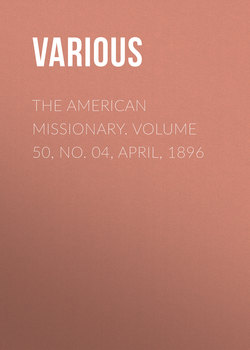Читать книгу The American Missionary. Volume 50, No. 04, April, 1896 - Various - Страница 5
The South
ОглавлениеNotes by the Way
Secretary A.F. Beard.
In making my rounds among the schools of the Association and of the churches I find new experiences in old paths and new incidents by the way. Within the limitations of "an article" I cannot recall them, but I invite my readers to visit with me some of the places en route.
FARM BUILDINGS, ENFIELD, N. C.
It is not a long journey from New York to Enfield, N. C. We will not find a New England village there when we leave the Weldon and Wilmington Railway. It is quite another part of the world. A ride[pg 118] of four miles among plantations and cotton fields brings us to the latest-born school of the Association. Here are a thousand acres of arable land, which ought to be a fortune to its owner and has been in years gone by. Now, however, cotton and corn have ceased to be kings, oftentimes they are more like beggars. Thus it came to pass that this noble plantation became the property of a benevolent lady in Brooklyn, N. Y., who made it a splendid gift to the Association, with sufficient money to build the fine brick building which stands in the center of this great farm, the beginning of the "Joseph K. Brick Normal, Agricultural, and Industrial School."
Is it needed? We will say it is when we have acquainted ourselves with the condition of the colored people in these parts. I know not what could have been their condition in slavery. Except for the buying and the selling, it could not have been worse than we find it here to-day. Rags, ignorance, poverty, and degradation indescribable are in the cabins. Have the children been taught in any school? No. Can the parents read? No. Shall we find a Bible in the cabins? No. Weak, wicked, and absolutely poor, in dumb and stolid content with animalism and dirt, here families are herding like cattle, in windowless and miserable cabins of one room. The children who fail to receive the benignity of death grow up here and exist and suffer in this dreadful life. Yet we can ride by this plantation and in sight of it any day on our way to Florida, and never see what is so near. Nevertheless, here it is a reality much worse than it reads, for ten times one are ten and ten times ten are one hundred.
In such environment and conditions is our "Agricultural and Industrial School" now half way through its first year.
PRINCIPAL T. S. INBORDEN.
If the principal of it should tell the story of his life, how he walked eight miles every day for three months of the year to learn to read and write; how he worked for 20 cents a day to raise enough money to get away from his limitations for an education; how he became bell-boy at a hotel until he earned enough to buy a grammar, an arithmetic, and a dictionary; how he found himself at last at Fisk University with $1.25 with which to continue his studies for eight years before he could graduate; how he worked his patient way along teaching in vacation, pulling himself up hand over hand, it would pay one to stay over a day for it. There were only a few times during[pg 119] the eight years in Fisk when he had money enough to stamp a half dozen letters at once. This story, however, differs only in its incidents from that of other students at all of our colleges. The story of their struggles is the story of their strength.
